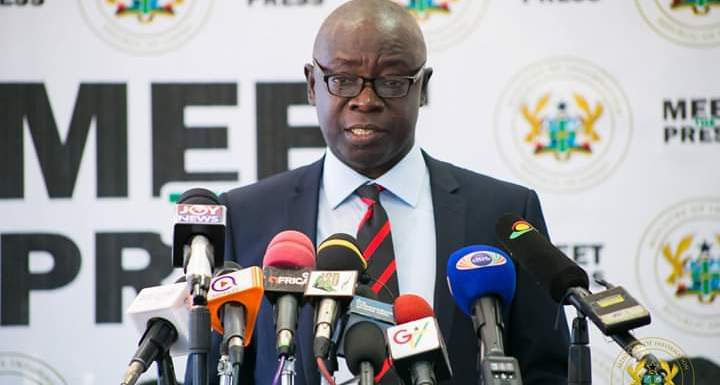Kwaku Asomah-Cheremeh
The Committee formed to probe allegations of corruption in rosewood trade in Ghana, has come out with its report, saying it did not adequate evidence to establish corruption cases against any officials of the government.
Minister of Lands and Natural Resources, Kwaku Asomah-Cheremeh, who presented the report to the media on Friday, February 14, 2020, said “however, the field investigations revealed that there are several institutional weaknesses and lapses in the Rosewood trade; from the community level to the ports of exit.”
He noted that this is due largely to the highly informal nature of its trade; which is composed of communities who informally harvest the timber for sale to agents, who then aggregate for sale to Rosewood traders and who in turn resell to the buyers (mostly Chinese).
According to him, several impounded truckloads of Rosewood which had no documentation to salvage or transport Rosewood, had managed to evade several checkpoints including the Police, National Security and District BNI officials, and had only been arrested at points very close to the harbor.
“Data capture of Rosewood exports at the port was questionable as TIDD statistics of exports largely did not conform with GRA Customs Export data capture,” he noted.
In July 2019, the Environmental Investigation Agency (EIA), published an investigative piece titled:
“Ban-boozled” How Corruption and Collusion fuel Illegal Rosewood Trade in Ghana”.
The publication alleged that there is an institutionalized scheme of corruption in Ghana in respect of illegal harvest, transport, and issuance of CITIES permits for Rosewood exports.
This scheme of corruption, it stated involved the fraudulent use of Salvage Permits, the mis-declaration of timber species, the forging of official documents and the retrospective issuance of CITES Permits.
About six million rosewood trees have been cut down in Ghana for illegal export to China since 2012, EIA reported.
Response
In response to these allegations, the Minister on August 26, 2019, inaugurated a Seven-Member Committee, Chaired by the Deputy Minister for Lands and Natural Resources, Benito Owusu Bio to investigate these allegations.
The Committee had the following representation: • Chairman of the Parliamentary Select Committee on Lands and Natural Resources; representative of Ghana Customs ; representative of Civil Society Organizations; Representative of Forest Research Institute of Ghana (FORIG); Representative of the Private sector;Representative of the Ministry of Lands and Natural Resources.
The Committee was specifically tasked to among other things examine all anomalies in respect of Rosewood salvage permits, transportation and export trade; investigate if Rosewood is still being traded in spite of the ban imposed by myself in March, 2019; and
iii) make the necessary recommendations for appropriate actions to be taken.
According to the Minister, the Committee completed their investigations and presented their report to him on December 23, 2019.
Findings
The Minister observed that “the allegation by the EIA that Ghana has exported over Six million Rosewood trees between the period 2012 – 2019 is a gross over-estimation of Ghana’s Rosewood export trade volumes.”
“Based on the inventory data available, Ghana does not have that quantity of merchantable Rosewood trees to be harvested and exported during the period in question,” he said.
” The Committee’s assessment showed that the actual Rosewood timber harvested for the period 2012 -2019, using the Chinese import data is 489,766 (Four Hundred and Eighty-Nine thousand, Seven Hundred and Sixty-Six) trees and not Six Million (6,000,000) as inaccurately stated by the EIA,” according to him.
He noted that the EIA methodology used in the calculation of number of trees harvested in Ghana is not scientific and cannot be accepted.
“The Committee on the other hand, admits that there are significant differences between the volumes of Rosewood timber imported by China and exported by Ghana, due principally to the deliberate misclassification and mis-declaration by freight forwarders, as a result of a lack of institutional capacity in GRA-Customs in relation to timber species identification.”
He added that the Committee was unable to prove the allegations made by EIA that CITIES permits were for sale based on investigations of witnesses; both material and persons.
“The video footages and other materials from the EIA did not provide enough evidence of collusion. The then Focal Person for CITES Permits Nana Kofi Adu Nsiah has challenged anyone who claims he paid monies to him for CITES permits to come out and proof the allegations.”
Recommendations
He said due to the serious nature of the allegations raised by the EIA, the Committee’s investigation encompassed the entire value chain of the species.
Through field visits to the hotspots of Rosewood exploitation, the Committee sampled grass-root opinions of communities along with interviews with the respective District Assemblies, he added.
The field investigations focused on exploring the interfaces between the operations of the Forestry Commission of Ghana, the Ghana Revenue Authority (GRA) – Customs Division, other Government agencies; such as the Metropolitan, Municipal and District Assemblies (MMDA’s), and the Police and other Intelligence Agencies, according to him.
The Committee, then took testimony from individuals involved in the Rosewood trade in Ghana and those mentioned in the EIA report.
As a final step in the preparation of the Final Report, the Committee used data sources from the TIDD Rosewood Export Statistics, GRA-Customs Export data on Timber export entries, Data from EIA and a host of other sources, he said.
The Committee, he stated, recommends extensive interagency collaboration between the Forestry Commission, the Police, the GRA-Customs, and the Intelligence agencies in ensuring that movement of banned and endangered tree species such as Rosewood is brought to a complete halt.
“Effective collaboration between GRA-Customs and TIDD at the port of exit is very essential especially in the identification of wood species before exports,” he observed.
BY Melvin Tarlue

